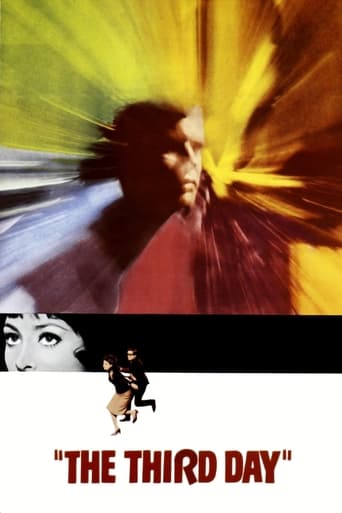moonspinner55
Adaptation of Joseph Hayes' book about a "buffoon" who survives a horrible car crash but with amnesia; he's unsure of his wealth and position, which his wife's elderly aunt is happy to fill him in on (she acts like a scorecard for the confused man, as well as the audience). Turns out he's a wealthy, ruthless boozer who holds the financial fate of most of the city's residents in his hands, being the owner of the local factory that he's considering selling off. He also had a woman in the car with him the day he drove off a mountain road, and if she dies he could be tried for homicide. Well-dressed but corny melodrama tries too hard to raise chills, such as when George Peppard sees something that jars his memory and Percy Faith's overly-fancy music swells up on the soundtrack like in a Hitchcock thriller. Roddy McDowall steals scenes as a nefarious relative (he's such a brittle prig, you half expect him to crack after Elizabeth Ashley slaps him), Sally Kellerman debuts in a showy flashback role, and Arte Johnson (pre-"Laugh-In") surprises with a serious performance as an unbalanced lounge pianist. The plot is slackly-handled by director Jack Smight. Under better circumstances, this might have been an exciting potboiler; as it is, the film's posh décor upstages the dull, soapy contrivances. *1/2 from ****
login2875
The Third Day is a good film, with good actors. But the reviewers seem not to have seen the movie. All assume that Roddy McDowall plays the brother of the Peppard character. Quite a trick, since Peppard plays the only main character not of the wealthy Parsons family. Who is Oliver Parsons, the character played by Roddy McDowall? He is the first cousin of Elizabeth Ashley's character, herself the only child of the Parsons patriarch (Herbert Marshall). Oliver's father is the deceased younger brother of the patriarch; Mona Washbourne plays the widow, Oliver's mother. Now that the patriarch is incapacitated by a stroke, who will get control of the company which has made the Parsons family rich? Oliver, the patriarch's nephew and closest male relative by blood, assumes it will be he, and already holds meetings of the board and sits at the head of the Parsons' dining table. But Peppard has married the boss's daughter. He is popular with the employees and wishes to revamp the company into the maker of modern parts using ceramics rather than ceramic figures long out of fashion. Oliver wants to sell off the company to a conglomerate looking for a tax write-off with no thought of the employees whose jobs the patriarch's son- in-law wishes to save. The audience will now know whom to favor. But the mysterious car accident throws into confusion the purposes of the patriarch's daughter and son-in-law. Without this knowledge of the Parsons family, the plot makes no sense. The joking demeanor between cousins, Oliver's mother berating her son for unprincipled ambition, the politics of the dining table, the police chief's pursuit of the son-in-law--all and most of the rest of the tale disappear into the reviewers' ignorance. Ashley and McDowall play brilliantly the two most interesting characters, who have survived together from childhood the Parsons politik and know each other very well. But it is Oliver's, and McDowall 's, movie. What does he know about the car accident, if anything? Almost every DVD box has a summary with at least one mistake in it, and a big one. Reviewers of The Third Day top this by mistaking the structure of the entire family whose machinations form the what, who, and why of the tale. How this happens, who can say? Too many popcorn breaks? The family relationships are emphasized in the dynamics of every scene in which two or more of the Parsons dynasty appear. Who is the villain, and in what does the villainy consist? Ashley's finest speech locates the answers in what else? Family values, and valuables.
Robin Moss
I was so surprised to find that other IMDb users admire this film that I had to declare my contempt for it.Despite the distinguished names in the credits, both in front of and behind the camera, this is a really shoddy movie. Written and directed like a fifth-rate T V show, it spins a totally incredible story of a man who loses his memory after a car crash, and learns that he is widely disliked and despised, and is now suspected of murdering the local slut. None of the characters behaves in a plausible way. For example, the wife receives a visit from a complete stranger. She goes downstairs to meet him, and although he acts and talks unusually and alarmingly, she nevertheless gets in his car and goes off with him without even knowing where they are going! The film is full of nonsense like that. Robert Surtees' controlled use of light and Percy Faith's melodic and lushly orchestrated score are welcome, but do not overcome the movie's basic problems.
Wally_Kalbacken
What caught my eye in this film is the last few sequences – which include a long chase along the Russian River in northern California. The rear projection looks feeble today – but that is the way it was in 1965. Arte Johnson is miscast – and that is underscored when, at the end of the chase, he and George Peppard haul out the fisticuffs in the surf. That final scene was filmed on the beach at Goat Rock State Park – just south of Jenner, California.



